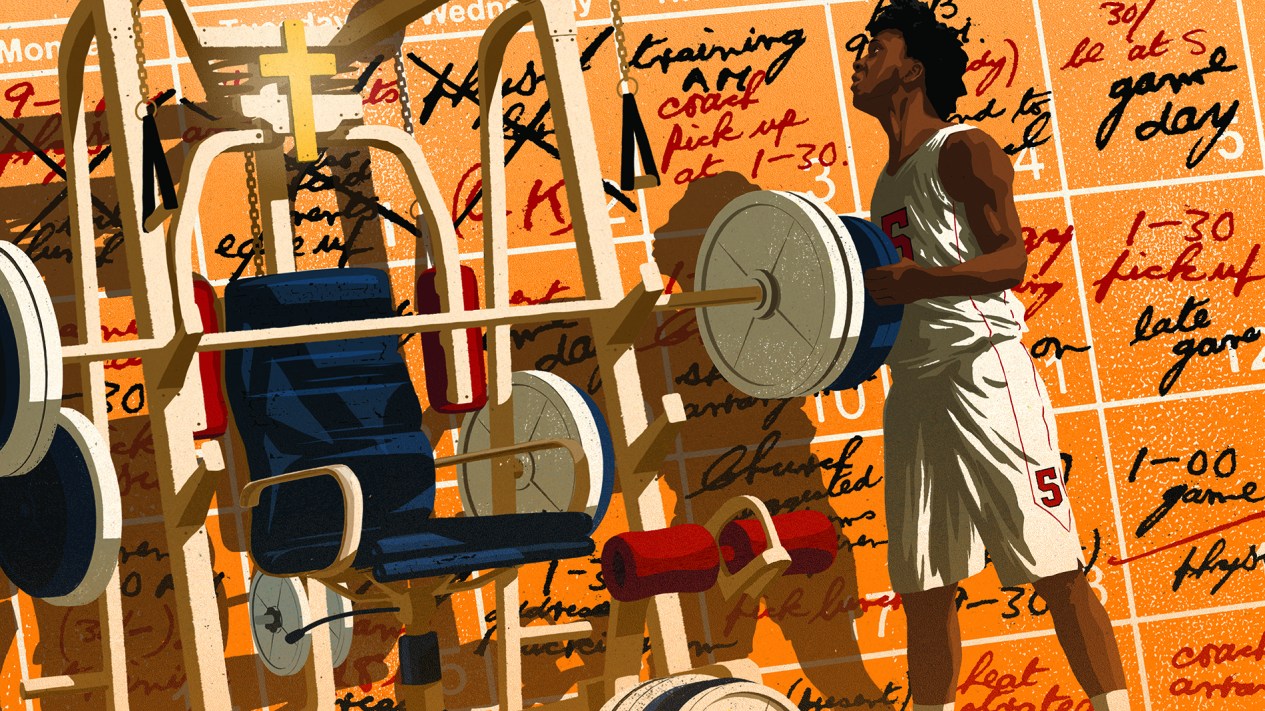No pain, no gain. Push through it. Put it all on the line.
Language plays an essential role in the win-or-lose environment of sports. Coaches call plays, offer correction, and make substitutions. They also exhort their players to strive for more, to reach for improvement: bigger, faster, stronger, better, a target that is always on the horizon.
Naturally, athletes internalize these messages, especially if they’re children or adolescents. And while the words are often intended to encourage valuable skills, like perseverance and persistence, that same language could be causing profound harm. Mantras like “no pain, no gain" can set a precedent of discounting our bodies’ warnings, making injury inevitable. Worse still, when a coach or trainer is seen as someone who demands pushing through the pain, young athletes begin to understand their value only in terms of their physical output. A missed goal or forgotten play isn’t just a personal blow—it’s now a bitter disappointment to their coach, teammates, or parents.
Not surprisingly, when these players grow into high school, college, and professional athletes, they are very rarely equipped with the language or opportunity to name the anxieties and fears that inextricably tie together their performance and worth.
“We have raised generations that define their identity by what they accomplish on the field,” observes attorney, author, advocate, and educator Rachael Denhollander, internationally recognized as the first woman to speak out about—and pursue criminal charges against—USA Gymnastics team doctor Larry Nassar. “That’s created a culture that prioritizes winning above everything else. … It sets the stage for massive mental health issues.”
Thankfully, the sports world is making strides in addressing mental health issues. A rise in academic studies on sports and mental health has trickled down to the newsstand, where notable athletes like Simone Biles and Kevin Love are interviewed on their personal experiences with anxiety, depression, and panic attacks. But even as organizations like the NCAA and major sports publications such as Sports Illustrated and ESPN discuss these struggles, real progress hinges on the work conducted behind the scenes in locker rooms, practice fields, and coaching offices.
One person trying to bring change is Edward Jones II, assistant athletic director for player development with Baylor Football. Jones works with many African American students, and he notes that racial battle fatigue often compounds existing stressors and potential mental health struggles.
“As a Black man, I understand the taboo that mental health is and has been in our community,” Jones said. “I try to be an example of handling your mental health so all of our student-athletes can see its benefit.”
Swimmer Aviry Reich, now a counselor and consultant, is another advocate and leader in the field. Reich experienced her own mental health crisis at 18. As an athlete at the University of Maryland, Reich reached the goal she’d set for herself as an eight-year-old girl: competing for a NCAA Division I school. But the shoulder pain she started to have as a preteen worsened until it developed into a career-ending injury when Reich was only a college freshman.
Reich felt ill-equipped to define who she was outside of athletics. She’d spent over a decade pouring herself into training, swimming, and beating personal records. Who was she without those milestones? Who had she been all along?
It’s questions like these, Denhollander says, that lie at the heart of sports culture viewed from a Christian perspective. “What is my identity? And how am I defining success? Those concepts are really very intertwined,” Denhollander explains. “And all of us are on a search for the answers.”
Although the growing conversation around mental health should overlap with Christian concerns, dialogue around faith, sports, and mental health remains critically underdeveloped. Too often, there is a sense among Christian leaders that mental health is a secular concern or that it competes with spiritual care.
Fortunately, there are academic institutions committed to students’ well-being that provide environments in which answers to Denhollander’s questions can be discovered through mentorship, guidance, and exploration. One of the leading institutions driving this conversation between the academy, the church, and the sports world is the Faith & Sports Institute (FSI) of Baylor University’s George W. Truett Theological Seminary. As a collective of athletes, coaches, chaplains, and scholars, the FSI team provides theological education and academic research for Christian flourishing in sports.
In a recent forum hosted by FSI, theologian John Swinton—also trained as a psychiatric nurse—addressed the apparent conflict between mental health and Christian spirituality. In our modern, Western culture, he noted, we too often carry a fragmented understanding of ourselves, never fully integrating our minds, hearts, souls, spirits, and bodies. But the gospel and God’s design for humanity beckon us to a whole existence—“we are our bodies as we are our souls.” Because of this, Swinton declared, “sport is soul work.”
John White, director of FSI and the Harold and Dottie Riley Associate Professor of Practical Theology at Truett Seminary, agrees. White notes that sports are intended to be cocurricular, not extracurricular. Athletics do not exist outside the formation of the whole person, just as the body does not exist outside of its relationship to the mind and soul, nor physical health outside of its relationship to mental and emotional health. People are being formed through sports. It’s not a choice or an option—it’s something that’s actively happening. So into what, and by what, are athletes being formed?
Broken Systems, Holistic Healing
Despite the best efforts of well-intentioned coaches and team leaders, wins and losses dictate success, job security, and career advancement in sports. Quality of care and depth of development fail to hold the same value in a culture that’s bent toward the transactional. The result, according to Cindy White, the cofounder of FSI and a former Division 1 athlete and coach, is a system that tends to deconstruct people, choosing to applaud and prioritize only that which drives them to higher athletic achievements. At some point, most athletes realize they’re caught up in a system for someone else’s gain.
But according to God’s design, people and pain cannot be compartmentalized. Human development, and a robust theology of humanity, resist this fragmentation with ferocity. And Christian coaches, White suggests, can do the same by providing safe spaces and a culture of love and belonging that applaud the person as well as the performance.
Approaching care and leadership in this way is also entirely compatible with a pragmatic desire for results. In her extensive research on this topic, Reich affirms that athletes who have ample psychological support—those who are encouraged to honor rather than suppress their mental health needs—generally perform better. This information shouldn’t be surprising, as coaches are already familiar with an integrative model of care due to their comprehensive approach to training the body. A team may employ nutritionists, physical therapists, or even neurofeedback professionals to help achieve optimal athletic performance. Therefore, there is very little risk—and potentially unlimited reward—to also provide access to a counselor or sports psychologist who can create a culture that welcomes moments of weakness and responds to pain and suffering rather than suppressing it.
Prioritizing mental health may be a huge undertaking, but there are accessible first steps. Coaches and others who interact with athletes can begin by building a culture of care on their teams. In her doctoral research, Reich found that the two main sources that influence whether an athlete would seek mental health support were parents and coaches. When encouraged by these groups to pursue mental health support, athletes were far more likely to do so.
Just like their bodies, the minds of our athletes are worth valuing and protecting. Parents and coaches can reinforce this truth by connecting the conversation with athletic training: A healthy, nourished mind is important for an athlete’s wellbeing. So, training and caring for the mind require the same intentionality that we devote to training and caring for the body. And for Christians, there’s the added incentive that this type of holistic training is also, as Swinton put it, “soul work.”
“We have so many resources to care for the body in sports,” says Cindy White. “Why would we leave the mind up to chance?”
FSI is working to remove chance from the equation as they empower coaches, athletes, and others by encouraging a holistic approach to sports. This summer, FSI will offer an online “Mental Health in Sports” course, which aims to help attendees better understand mental health as a Christian concern, identify the stigmas around mental illness within the sports world, and offer proven practices and resources.
A greater emphasis on mental health may very well lead to better outcomes on the field, yes, but it accomplishes so much more. Seeing the mind and body as God sees them—worthy of profound love and care—frees athletes from defining their worth by what they can or cannot produce. Over time and in the context of a culture of care, athletes can untangle their identity from their output, and instead they can begin to see themselves as mind, body, and spirit all wonderfully made and woven together, never to be torn apart.
Posted


